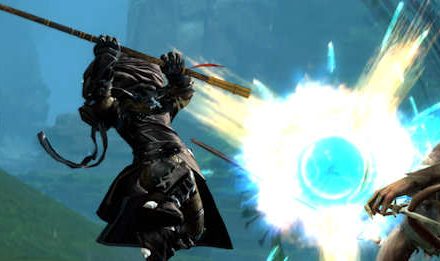While I don’t have thousands and thousands of hours logged in the world’s most popular massive-multiplayer online (MMO) games, I have tried my hand at a variety and gave them a fair shake. From World of Warcraft to Guild Wars 2 and EVE Online to City of Villains, I consider it accurate for me to claim to be an experienced player, one who knows what they like and what they don’t like about persistent online worlds.
Recently a friend purchased a copy of Final Fantasy XIV: A Realm Reborn for me, as some of his other friends were already playing and he wanted me to join them. I’ve played a fair amount of Final Fantasy games, particularly back in my SNES days, so I was expecting to see long cutscenes, plenty of odd names for things and places, and plenty of visual effects for every particular action. Someone told me “It’s like World of Warcraft, but actually good” and while I had a lot of skepticism, I was willing to at least humor my friend and play the game a bit.
Character Creation
I realize that Guild Wars 2 is a rare exception for the MMO genre in that the decisions and choices you make for your character during creation actually change the story and gameplay you’ll experience, but I was surprised at just how little the many choices I made during Final Fantasy XIV‘s character creation mattered – not one whit. What gods I worshiped, which region of the world I hailed from, nothing seemed to be referenced at a later point. They certainly didn’t have an impact as to which quests were available, that’s for sure.
What I do think makes FFXIV exceptional however is the idea that any single character can play every class. Tired of being a warrior? Start a different quest line and you can become a wizard. Or a blacksmith. Or own a fishing boat. Unfortunately, that variety is gated behind a lot of repetition; each martial or magical class unlocks a new possibility only at level 10, and if accepted you have to start over at level 1, grinding up your new class until level 30, at which point you can get a new “role,” similar to a D&D prestige class. Classes can be switched freely, but you are only as powerful as your current class level – a level 50 wizard who wants to try being a rogue gets to functionally start over at level 1.
Because I wanted to play a stabby-type character, I was told to pick Marauder. This meant I would unlock the possibility of becoming a rogue at level 10, resetting all of my progress. The only progression from this point is to hit level 30 and become a ninja, or starting over with a different base class, in the hope to unlock a new general class. Color me less than interested in replaying every quest in the game more than once.
Class Roles
In many role-playing, dungeon-delving games there is what is known as the “holy trinity” of classes – to succeed a party must have at least one healer, one tank, and one DPS-dealer. I know to some degree World of Warcraft gives a bit of variety here, in that a priest (normally a healer) can specialize in curses and damage (becoming more DPS-focused), while Guild Wars 2 and EVE Online generally throw the whole notion out the window. I was genuinely displeased to discover that FFXIV has an even more restrictive party-selection toolkit than WoW does; if I want to queue for a dungeon or special event, a small window pops up to tell you when the game has found other members for your party. Since I am playing a rogue, I am classified as “DPS” and will be paired with one other DPS (either ranged or melee), one tank, and one healer, and I can’t enter the dungeon until all those slots are filled.
What this means, and what games like GW2 tried very diligently to move away from, is that if there’s a particular lack of focused healers on at a given time, nobody can run a particular dungeon. There are always (always) plenty of DPS classes, but it seems that not nearly as many people gravitate to playing the tank or healer, leading to wait times which, as my timer showed me last night, could be well over an hour.
What’s more, as a rogue a large part of my abilities revolve around using Stealth (a specific effect which makes me invisible until I attack), but most boss fights automatically strip Stealth once they commence, utterly removing one of my core class features. I also saw this through many personal quests and side adventures – giving a character class a particular ability only to completely negate it because it’s too hard to think of other ways to balance things leaves me with a sour perception of the designers.
Button-Pressing
My most major complaint with City of Villains, aside from the absolutely mind-numbing repetition of the same 3-4 mission types, was the lack of actual engagement during battle. Combat boiled down to “press 1 until 2 lights up, then hit 2. Eventually 3 will light up, hit that,” cycling back around. No matter how many abilities/powers/actions were available to the character, it just became a game of “drum my fingers across the numpad to win.” Sadly, I’ve found FFXIV to be nearly identical – I press one button to start a combo, I press another button to continue the combo, and occasionally the third button will light up and I can press that one to do some big move. Otherwise, it’s back to the 1-2 flip-flip all over again.
With games like Guild Wars 2 that have active dodge mechanics and dynamic enemies, combat seems to flow and move, actually engaging the player. There’s a limited number of skills/actions, and they do very different things, making the player’s skill at using them at the right time the most important key to victory. Here I found a similar experience to my old WoW and CoV days; a hotbar overflowing with skills, actions, abilities, and items, only three or four of which were at all useful in 99% of circumstances.
Combat is boring, and I think that’s a major failing for a game where combat is the primary method to gain experience.















